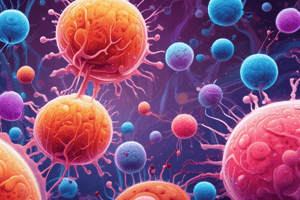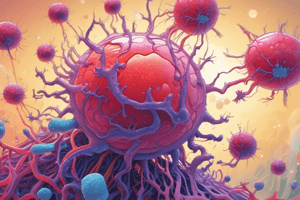Podcast
Questions and Answers
Which statement accurately describes the primary role of the innate immune system?
Which statement accurately describes the primary role of the innate immune system?
- It acts as a first line of defense, responding to pathogens immediately. (correct)
- It produces antibodies specific to each pathogen.
- It provides long-term immunity by remembering past infections.
- It targets specific pathogens after being exposed to them.
What distinguishes the adaptive immune system from the innate immune system?
What distinguishes the adaptive immune system from the innate immune system?
- It acts as the first barrier against pathogens.
- It provides a non-specific response to all pathogens.
- It involves cells that constantly patrol the body for infections.
- It provides long-term immunity by creating pathogen-specific responses. (correct)
Which characteristic is associated with the innate immune system?
Which characteristic is associated with the innate immune system?
- Specific, adaptive, and memory-based response.
- Delayed, specific, and involves antibodies.
- Rapid, non-specific, and lacks memory. (correct)
- Only activates after exposure to a pathogen.
Which of the following best describes the functions of B-cells in the immune response?
Which of the following best describes the functions of B-cells in the immune response?
What is a key function of T-cells in the immune system?
What is a key function of T-cells in the immune system?
How do humoral and cell-mediated immunity differ in their functions?
How do humoral and cell-mediated immunity differ in their functions?
What role do memory cells play in the adaptive immune system?
What role do memory cells play in the adaptive immune system?
Which of the following activities is NOT a characteristic of the adaptive immune system?
Which of the following activities is NOT a characteristic of the adaptive immune system?
What occurs during the activation phase of the adaptive immune response?
What occurs during the activation phase of the adaptive immune response?
Which statement best describes the attack phase of the adaptive immune response?
Which statement best describes the attack phase of the adaptive immune response?
Where are lymphoid tissues located in the body?
Where are lymphoid tissues located in the body?
What is the function of primary lymphatic organs?
What is the function of primary lymphatic organs?
Which of the following statements is true regarding secondary lymphatic organs?
Which of the following statements is true regarding secondary lymphatic organs?
What role do macrophages play in the adaptive immune response?
What role do macrophages play in the adaptive immune response?
What happens to immune cells after they have successfully targeted and eliminated pathogens?
What happens to immune cells after they have successfully targeted and eliminated pathogens?
Which of the following correctly describes the role of neutrophils in the immune response?
Which of the following correctly describes the role of neutrophils in the immune response?
What do BCRs and TCRs do after activation?
What do BCRs and TCRs do after activation?
What are the functions of antibodies in the immune system?
What are the functions of antibodies in the immune system?
What is the general structure of an antibody?
What is the general structure of an antibody?
What are the five major classes of antibodies?
What are the five major classes of antibodies?
What are the physical barriers of the innate immune system, and how do they prevent infection?
What are the physical barriers of the innate immune system, and how do they prevent infection?
Which statement about BCRs (B cell receptors) is correct?
Which statement about BCRs (B cell receptors) is correct?
What role do TCRs (T cell receptors) play in the immune system?
What role do TCRs (T cell receptors) play in the immune system?
What is the function of the IgE antibody class?
What is the function of the IgE antibody class?
How do immunogens generate immunological memory?
How do immunogens generate immunological memory?
What characteristic does NOT increase the immunogenicity of an antigen?
What characteristic does NOT increase the immunogenicity of an antigen?
What is a primary immunogenic response?
What is a primary immunogenic response?
Which of the following correctly describes thymus-dependent (TD) antigens?
Which of the following correctly describes thymus-dependent (TD) antigens?
How do the characteristics of an antigen enhance its recognition by the immune system?
How do the characteristics of an antigen enhance its recognition by the immune system?
Which of the following factors does NOT contribute to the immunogenicity of an antigen?
Which of the following factors does NOT contribute to the immunogenicity of an antigen?
What defines a secondary immunogenic response?
What defines a secondary immunogenic response?
Which feature is essential for increasing the immunogenicity of an antigen?
Which feature is essential for increasing the immunogenicity of an antigen?
What is the primary role of IgM in the immune response?
What is the primary role of IgM in the immune response?
How does IgM activate the complement system?
How does IgM activate the complement system?
What is the main function of IgA antibodies?
What is the main function of IgA antibodies?
Where are IgA antibodies predominantly located in the body?
Where are IgA antibodies predominantly located in the body?
Where are IgD antibodies predominantly found?
Where are IgD antibodies predominantly found?
How do IgD antibodies contribute to the elimination of self-reactive B-cells?
How do IgD antibodies contribute to the elimination of self-reactive B-cells?
What functions do IgE antibodies primarily serve?
What functions do IgE antibodies primarily serve?
Flashcards are hidden until you start studying
Study Notes
Innate Immune System Role
- Acts as a first line of defense, responding immediately to pathogens.
- It is a rapid, non-specific response, lacking memory.
Adaptive Immune System Role
- Provides long-term immunity by creating pathogen-specific responses.
- It is a delayed, specific response, involving memory specialized cells and antibodies.
B-Cells General Functions
- Produce antibodies and help neutralize pathogens.
T-Cells General Functions
- Recognize and kill infected host cells or help activate other immune cells.
Humoral and Cellular Immunity
- Humoral immunity involves B-cells producing antibodies to neutralize pathogens.
- Cell-mediated immunity involves T-cells directly attacking infected cells.
BCR and TCR Activation
- BCRs secrete antibodies, while TCRs proliferate and destroy infected cells.
Antibodies
- Bind to antigens on pathogens, neutralizing them and facilitating their removal.
- They are Y-shaped molecules with two heavy chains and two light chains.
Antibody Classes
- IgA, IgG, IgM, IgD, and IgE are the five major classes of antibodies, each performing different immune functions.
Innate Immune System Physical Barriers
- Skin and mucous membranes act as physical barriers, blocking pathogen entry and trapping microbes.
Adaptive Immune Response Activation Phase
- Immune cells rapidly divide, increase in number, and begin producing antibodies to target pathogens.
Adaptive Immune Response Attack Phase
- Activated immune cells neutralize, kill, or remove pathogens through cellular and humoral responses.
- This includes the destruction of pathogens through antibodies and infected cells by T-cells.
Lymphoid Tissues
- Found in the skin, spleen, and mucous membranes of the digestive and respiratory tracts.
Primary Lymphatic Organs
- Include the thymus and bone marrow, responsible for producing and maturing lymphocytes.
Secondary Lymphatic Organs
- Include lymph nodes, spleen, tonsils, and adenoids.
- Their purpose is to filter lymph and blood, trap pathogens, and help activate immune responses.
Immunogens
- Can generate immunological memory by stimulating memory B-cells and T-cells.
- These memory cells respond faster upon re-exposure to the same pathogen.
Immunogenicity of Antigens
- Four characteristics enhance immunogenicity:
- Large size: Larger antigens are more easily recognized by the immune system.
- Foreignness: The more foreign an antigen is to the body, the stronger the immune response.
- Chemical complexity: Complex antigens with diverse structures are more likely to be detected and processed by the immune system.
- Proper degradability: Antigens that can be easily broken down by immune cells are more likely to trigger an immune response.
Primary Immunogenic Response
- Occurs upon the first exposure to an antigen.
Secondary Immunogenic Response
- Is a stronger, faster response that occurs upon re-exposure to the same antigen due to the presence of memory cells.
Thymus-Dependent Antigens (TD Antigens)
- Require antigen-presenting cells to stimulate T-cells, which in turn activate B-cells.
IgM Antibodies
- The first antibody produced in response to an infection.
- They activate the complement system by creating a complex with antigens and recruiting complement proteins.
IgA Antibodies
- Protect mucosal surfaces by neutralizing pathogens and preventing their entry.
IgA Antibody Location
- Predominantly found in mucosal areas such as the respiratory and gastrointestinal tracts.
IgD Antibodies
- Primarily found on the surface of mature B-cells, assisting in antigen recognition.
IgD Antibody Role in Eliminating Self-Reactive B-cells
- They bind to autoantigens, signaling these B-cells to undergo apoptosis (programmed cell death) thus preventing autoimmune reactions.
IgE Antibodies
- Bind to allergens and parasites, triggering mast cell and basophil degranulation.
- This releases histamine and other inflammatory mediators, causing allergic reactions or fighting parasites.
Studying That Suits You
Use AI to generate personalized quizzes and flashcards to suit your learning preferences.




